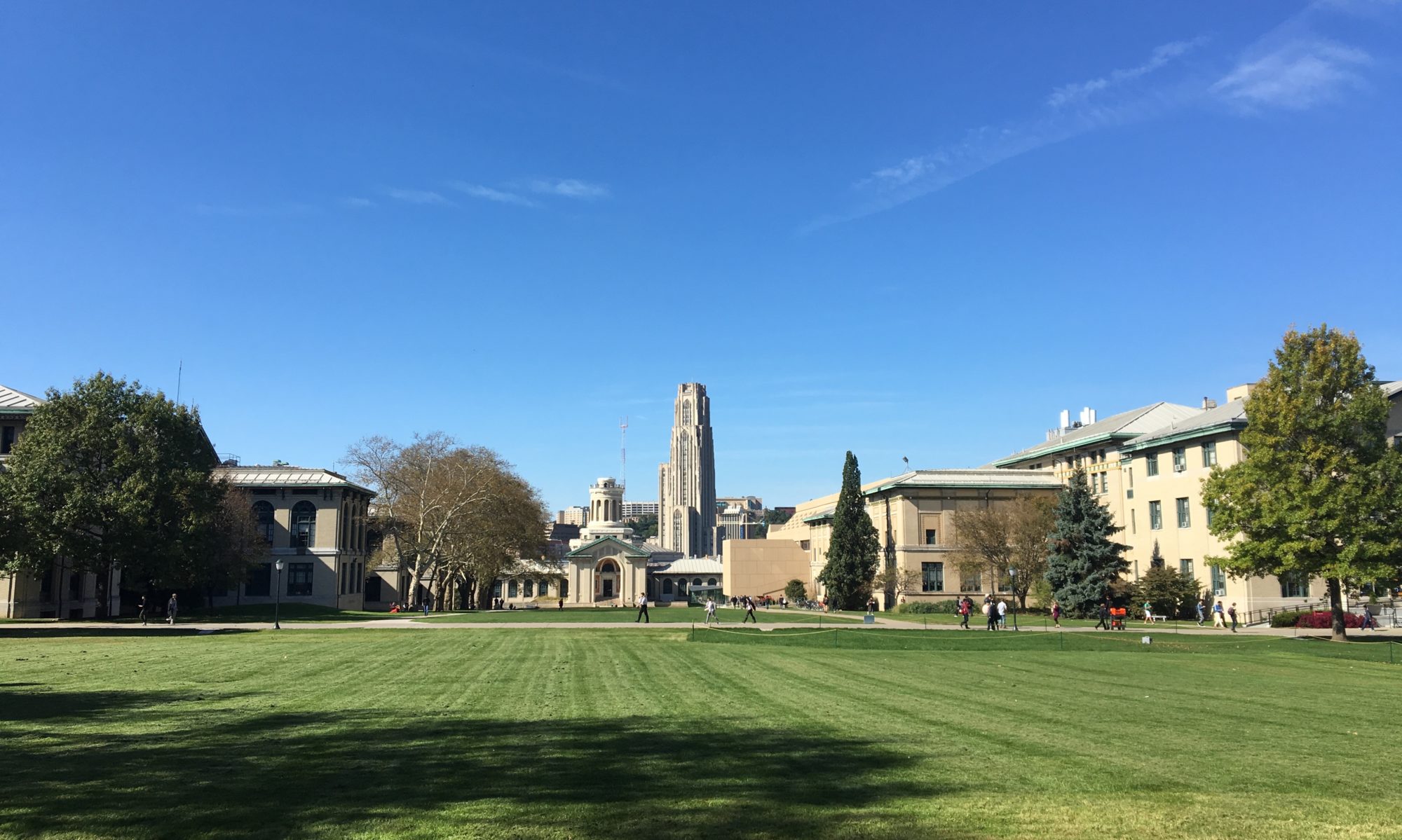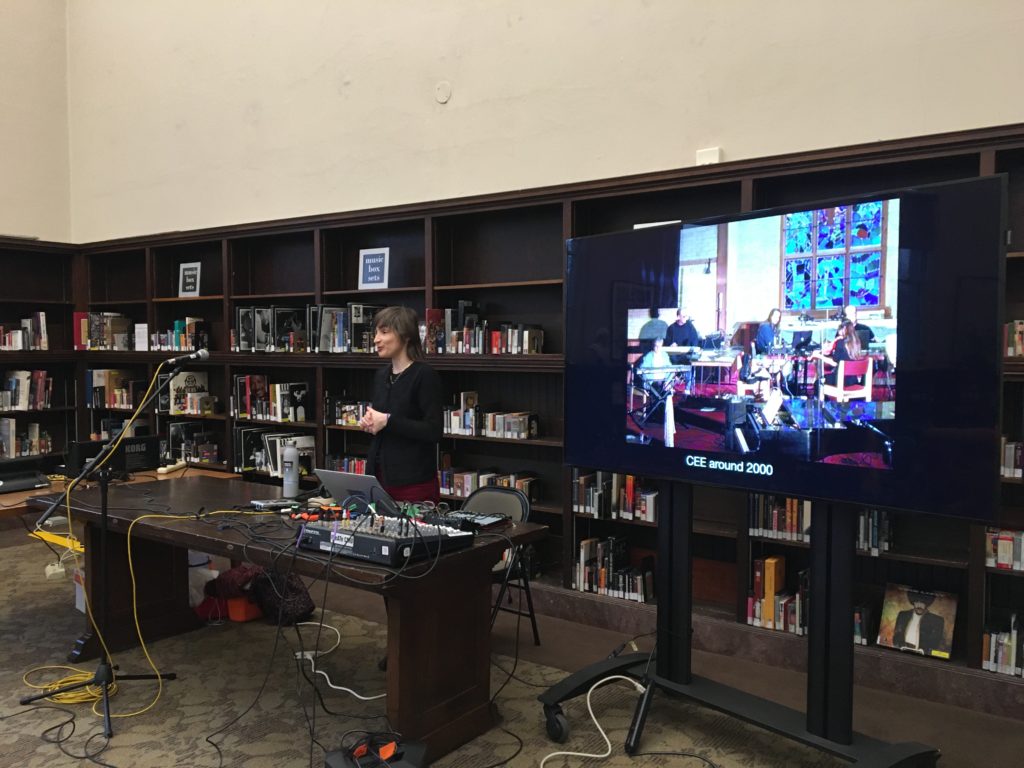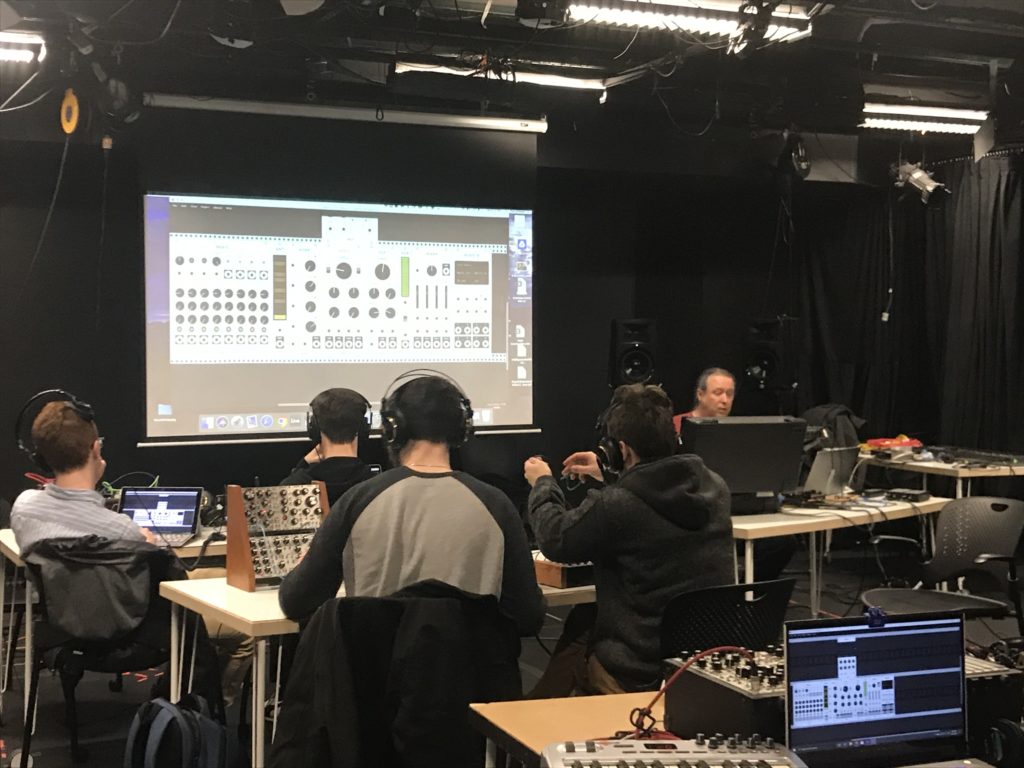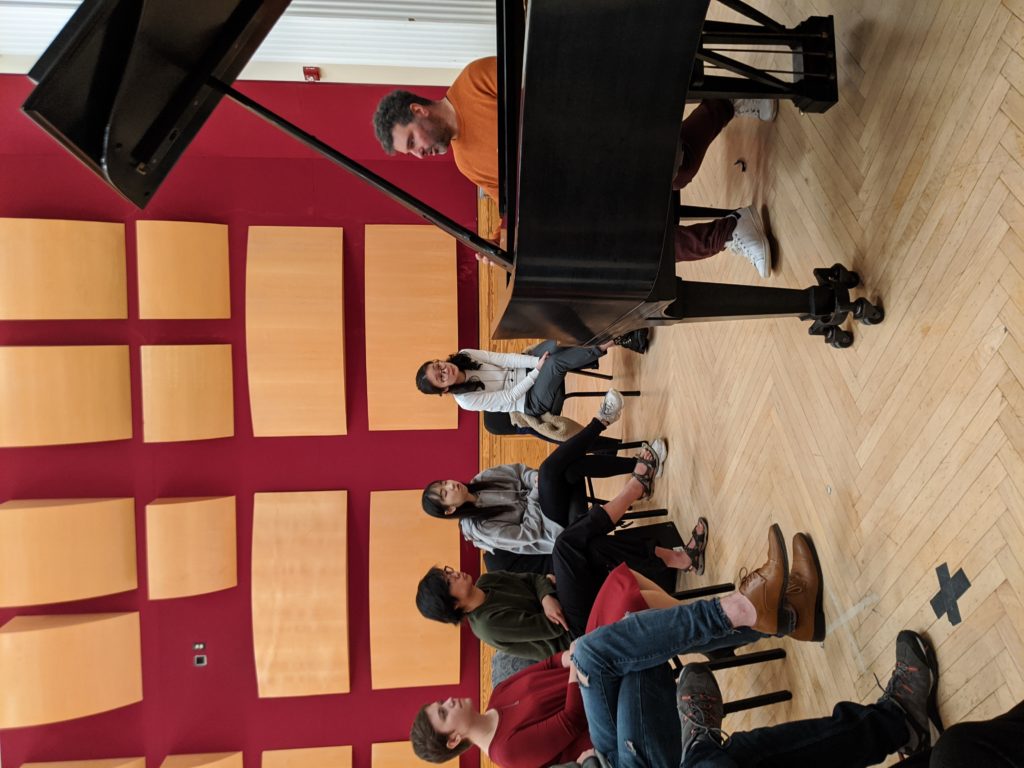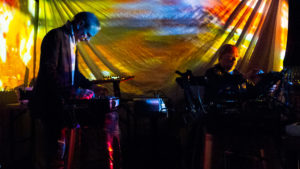For information about the CEE group workshop on Monday, February 24, click here.
Due to the backgrounds and expertise of the members of the Canadian Electronic Ensemble, they are holding a series of specialized workshops tailored to different aspects of electronic music-making, composition, and improvisation.
All of these workshops are on Tuesday, February 25, 2020. Light snacks will be provided.
RSVP is not required, but if you know in advance that you will be attending, please email Alexa Woloshyn.
Students and community members attend the CEE specialized workshops.
EQ: Electronic music-making for Women and Non-Binary individuals More
5-7pm, Carnegie Library of Pittsburgh (Oakland), Music Department
Facilitator: Rose Bolton
Free and open to all women and non-binary folks interested in electronic music-making
During this workshop, Rose will demonstrate fundamental techniques and software in her creative electronic practice. The workshop will explore mixing in a DAW (digital audio workstation), using vocals and synthesizers from the CLP’s own electronic instrument collection. Participants can practice alongside in their DAWs (bring your own laptop).
Participants of all skill levels are welcome to join the workshop. Feel free to bring your laptop with your DAW and audio samples of your work (complete or in-progress).
Come to listen, ask questions, and make some electronic music! Light snacks will be provided.
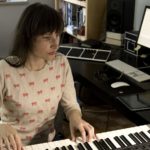 Rose Bolton is one of Canada’s most innovative and multi-faceted composers. She has been creating full-length film scores for broadcasters such as CBC, TVO, Arte and Super Channel for over a decade. She also has a thriving compositional practice creating electronic and instrumental music for innovative multimedia projects, as well as for concert performers. These concert compositions include major works such as Song of Extinction, a 45 minute work for Toronto’s Luminato festival and created in collaboration with filmmaker Marc de Guerre and Griffin Award winning poet Don McKay. Other recent concert and electronic works include a piece for the Kitchener Waterloo Symphony with ambient electronics, and a sound and video installation at the Canadian Music Centre for Toronto’s Nuit Blanche. Her concert music has been performed across Canada by Canada’s leading ensembles, including the Vancouver Symphony, the Esprit Orchestra. Rose Bolton has a Masters degree in composition from McGill University.
Rose Bolton is one of Canada’s most innovative and multi-faceted composers. She has been creating full-length film scores for broadcasters such as CBC, TVO, Arte and Super Channel for over a decade. She also has a thriving compositional practice creating electronic and instrumental music for innovative multimedia projects, as well as for concert performers. These concert compositions include major works such as Song of Extinction, a 45 minute work for Toronto’s Luminato festival and created in collaboration with filmmaker Marc de Guerre and Griffin Award winning poet Don McKay. Other recent concert and electronic works include a piece for the Kitchener Waterloo Symphony with ambient electronics, and a sound and video installation at the Canadian Music Centre for Toronto’s Nuit Blanche. Her concert music has been performed across Canada by Canada’s leading ensembles, including the Vancouver Symphony, the Esprit Orchestra. Rose Bolton has a Masters degree in composition from McGill University.
Modular Synthesis 101 More
- headphones
- laptop with VCV Rack installed (click here for an installation tutorial; this video is for Windows: on a Mac simply unzip the file and drag the resulting Rack.app into the Applications folder)
- have an account registered on the VCV Rack web site so that modules can be updated and added
- this file on their laptop (contains an unpatched basic modular synthesizer that we will use during the presentation)
5:30pm-7:30pm, Media Lab (Hunt Library)
Free and open to all CMU students, faculty, and staff
Facilitators: Paul Stillwell and David Sutherland
In this workshop, participants move quickly from discussing the components of sound to how those relate to sound creation using modular synthesizers. Participants will learn principles that apply to both hardware and software synthesizers.
We will begin with a blank slate, create a full blown patch, modify the patch, and maybe even experiment.
All skill levels are welcome. Students without access to a laptop for the VCV Rack will have access to the hardware systems (first come, first served).
Students should bring the following:
Paul Stillwell is a musician and composer who is fascinated by the darker side of sound. Influences range from Psychedelic Rock, Dark Ambient, and Berlin School electronica to musique concrète. The Canadian Electronic Ensemble, of which he is a long-time member, has had a profound impact on his musical style and sensibilities.
In 2016, Paul founded the Frequency Freaks Workshops, an inclusive community of composers, musicians and electronic instrument makers. He is also a co-organizer of the Toronto Sound Festival which features talks on mixing, mastering, sound design, field recording, game audio, audio for VR, composition for large and small screens, instrument building, and live performances.
As a solo performer, Stillwell works under the moniker Intrepita. He is also a member of the improvising collective Not Your Average Worker Bees (with David Sutherland and Jeremy Sykes) combining live improvised electronic music with improvised digital and analog visuals.
During the day, Stillwell works as an IT Engineer specializing in Network Security.
In 1970, music was a second choice for David Sutherland, because all the religion courses were filled while registering at Dawson College. The pursuit of music led to him sitting behind Stockhausen at a concert where someone was playing an EMS Putney. In youthful folly, it seemed like a good thing to do, and Sutherland got his start in electronic music in 1972 at Concordia University.
He was a member of MetaMusic, attended the graduate course in electronic music at McGill University, and taught the undergraduate course for non-composers at McGill. Sutherland moved to Toronto and worked as an audio engineer and composer until the lure of computers and money proved overwhelming. He spent 30 years working in the IT world, retiring from the University of Toronto 7 years ago.
Since retiring, Sutherland has engaged in a range of electronic music related activities, including becoming the newest member of the Canadian Electronic Ensemble (1971–).
Student Composers Seminar More
6pm-8pm, Hall of the Arts 225
Open to student composers
Facilitators: David Jaeger and Jim Montgomery
Composers David Jaeger and Jim Montgomery will discuss some of their works and approaches to mixed and electronic media. Students are encouraged to share some of their in-progress works for feedback.
David Jaeger, C.M., is a Toronto based composer, music producer and broadcaster, who was a member of the Canadian Broadcasting Corporation’s (CBC) Radio Music department from 1973 to 2013. In 1978 he created “Two New Hours”, a contemporary music network broadcast series which was heard on the national CBC Radio Two network until spring, 2007. He was CBC English Radio coordinator of the CBC/Radio-Canada National Competition for Young Composers from 1974 to 2002.
In the early 1970s Jaeger established a digital sound synthesis facility at the University of Toronto, one of the first in Canada. In 1971 he co-founded the Canadian Electronic Ensemble, together with David Grimes, Larry Lake and Jim Montgomery. Many of Jaeger’s compositions combine acoustic instruments with electronic music media, but he also composes for standard instrumental forces.
In 2018, Jaeger was named a member of the Order of Canada.
Jim Montgomery began his formal studies in music as a horn player, and completed a Bachelor of Music degree with majors in performance and composition. He has been involved with electroacoustic music since 1970 when he came to the University of Toronto as a graduate student in composition, where he studied with Gustav Ciamaga and John Weinzweig. He is a founding member and continues to be active with the Canadian Electronic Ensemble, the world’s longest live electroacoustic group.
In his career as an Arts Administrator, Jim Montgomery has served as Administrative Director of New Music Concerts from 1984 to 1987 and from 1988 to 2005 as Artistic Director of the Music Gallery.
Jim Montgomery is a student and instructor at the Standing Wave School of Martial and Healing Arts (Toronto) where he teaches Uechi-ryu Karate. He holds the rank of Godan (black belt, fifth degree).
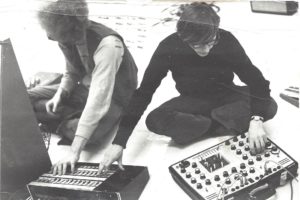 Jaeger and Montgomery in 1971
Jaeger and Montgomery in 1971
Approaches to Piano Improvisation for Classical Musicians More
6:30pm-8pm, ACH, CFA
Open to piano students
Facilitator: John Kameel Farah
Pianist-composer John Kameel Farah offers a workshop in improvisational techniques for piano students with an interest in getting into improvisation. Farah focuses on simple exercises he’s developed over the years, in which the player takes simple material and slowly develops it with basic techniques, to lay the foundation for creating their own improvisation language. Students are encouraged to bring the pieces they’re currently working on. After introducing a technique and demonstrating an example, Farah talks the student through a guided improvisation, slowly building the confidence for them to continue improvising on their own.
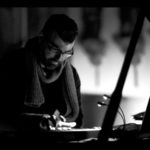 John Kameel Farah is a pianist, composer and visual artist, who embraces aspects of Early & Experimental Music, Improvisation, Middle-Eastern Music rhythms and modes and all forms of Electronic Music. He studied piano and composition at the University of Toronto, where he was a two-time recipient of the Glenn Gould Composition Award, and afterwards took private lessons with minimalist composer Terry Riley in California. In performance he combines the piano with effects processing and synthesizers, moving freely between improvised fugues, drone soundscapes, Near Eastern scales and modes, and driving, asymmetrical rhythms, referring to it as “Baroque-Middle-Eastern-Cyberpunk”. He is based in Berlin.
John Kameel Farah is a pianist, composer and visual artist, who embraces aspects of Early & Experimental Music, Improvisation, Middle-Eastern Music rhythms and modes and all forms of Electronic Music. He studied piano and composition at the University of Toronto, where he was a two-time recipient of the Glenn Gould Composition Award, and afterwards took private lessons with minimalist composer Terry Riley in California. In performance he combines the piano with effects processing and synthesizers, moving freely between improvised fugues, drone soundscapes, Near Eastern scales and modes, and driving, asymmetrical rhythms, referring to it as “Baroque-Middle-Eastern-Cyberpunk”. He is based in Berlin.
